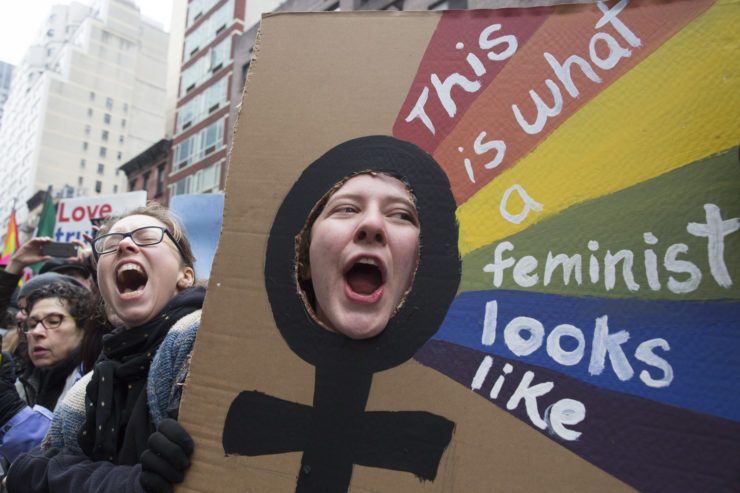Conservatives have to get smarter about sexual politics.
Biden’s Radical Feminist Legacy

VAWA never sought to end violence against women so much as to upend the patriarchy.
This month marks the 27th anniversary of the Violence Against Women Act (VAWA)—the passage of which President Joe Biden, the original Senate sponsor, frequently trumpets as a crowning moment of his career. Since its inception, the law has enjoyed broad bipartisan support, but this is largely because most Americans do not fully comprehend the law’s more radical origins and aims. They have assumed that the law was designed with the noble intent of more effectively protecting women from physical assault and criminal violence. Though individual provisions of the law may promote this goal, VAWA, taken as a whole, has been one of the Left’s most effective tools for fundamentally transforming America.
Written in large part by feminist law professor Victoria Norse, in collaboration with then-Senator Biden’s office, VAWA was the culmination of decades of radical feminist theory and activism. In the years proceeding the drafting and passage of VAWA, activists associated with the women’s liberation movement and its offshoot anti-rape and battered women’s movements developed and promulgated the view that violence against women—rape, spousal abuse, and harassment—is not caused by deviant or pathological individuals. Nor is it an aberration from American principles and institutions. Rather, violence is a political tool used to control and subjugate women in public and private life and is the logical expression of the American social, political, and economic order which extols the nuclear family, limited government, and capitalism.
According to this view, male aggression cannot be adequately addressed through an impartial legal system that seeks to prosecute, punish, restrain, and rehabilitate individual perpetrators of violence. Underlying misogyny in the system itself would preclude it from ever administering justice. Instead, violence against women must be addressed through a political movement that seeks to change social norms and redistribute resources, power, and control to women, with the long-term aim of a genderless, socialist society.
Summarizing these goals for reform, Susan Schechter, one of the founding leaders of the battered women’s movement, asserted, “Since male supremacy is the historical source of battering, and class domination perpetuates male privilege, a long-range plan to end abuse includes a total restructuring of society that is feminist, anti-racist, and socialist.”
Over the course of the seventies and eighties, activists associated with the anti-rape and battered women’s movements worked to promote social transformation along these radical lines through the formation of political coalitions, the publication of educational materials and shelter manuals, and intense lobbying. These efforts culminated in the introduction of VAWA to Congress in 1990. When VAWA finally passed both houses of Congress in 1994, Joe Biden proclaimed, “While legislation alone cannot change people’s values, the education, training, and attention provided by the Violence Against Women Act can bring progress in changing our attitudes and our actions towards this violence.”
Because VAWA passed as part of a crime bill during a period when Americans were highly supportive of policies that were tough on crime, the act did partially promote the use of the criminal justice system to address violence against women. However, VAWA’s provisions have always focused on redistributing resources and combatting discriminatory patterns that contribute to so-called patriarchal social control. To this day, a significant amount of the money allocated under the act goes to fund financial and legal welfare programs, media campaigns, and treatment, prevention, and education programs controlled by feminist coalitions. These coalitions have a history of excluding organizations and treatment options that do not align with what has proven to be a flawed view of the causes and solutions of violence.
Since its initial passage, VAWA has been reauthorized and expanded three times. With each new reauthorization, leftist supporters have worked to expand its scope and reach. As the law currently undergoes congressional consideration for its fourth reauthorization, sponsors have incorporated various controversial new provisions, such as a restriction of Second Amendment rights for those accused of abuse, a requirement that biological men identifying as transgender women be admitted to women’s shelters, and an expanded definition of domestic violence that includes not just physical abuse, but any type of words or actions that might be interpreted as an attempt to exert power or control over a victim.
The approach of many on the right during periods of reauthorization has been to accept the premise of the law as sound and to oppose the latest leftist expansions, arguing that they stray from the law’s original intent of protecting women from violence. Leftist defenders of the law in turn generalize their opponents as bigots who oppose extending the law’s protections to LGBT individuals, immigrants, people of color, etc.
But protecting women from the violent behavior of deviant individuals has never been the primary intention of VAWA, which explains why many of the law’s most ardent proponents oppose the addition of strong provisions to crack down on threats that inordinately affect women such as female genital mutilation, honor violence, child marriage, and sex trafficking. Congressional champions of the law also have a history of opposing amendments to eliminate wasteful, duplicate, and ineffectual programs in an effort to provide better funding and oversight for rape kit testing—even though such testing is the most effective means of identifying and incarcerating recidivist rapists.
Real physical abuse and criminal violence against society’s most vulnerable members make Americans sympathetic to a law purportedly designed to prevent and redress such acts, but the intention of VAWA has always been radical social, political, and economic transformation. But the real meaning of the law has never been recognized or exposed. During its original congressional consideration, radical feminist Andrea Dworkin, pleasantly surprised at the high level of Senate support for the bill, candidly observed that the senators “don’t understand the meaning of the legislation they pass.”
VAWA is hostile to the idea of equal protection of the law and to the crucial role that the nuclear family plays in protecting children and women from abuse. We should reject VAWA’s radical efforts at social transformation and return to the goal of protecting all citizens equally and effectively through the enforcement of strong provisions against criminal acts of violence and the promotion of civil institutions, like the nuclear family, that contribute to the achievement of this goal.
The American Mind presents a range of perspectives. Views are writers’ own and do not necessarily represent those of The Claremont Institute.
The American Mind is a publication of the Claremont Institute, a non-profit 501(c)(3) organization, dedicated to restoring the principles of the American Founding to their rightful, preeminent authority in our national life. Interested in supporting our work? Gifts to the Claremont Institute are tax-deductible.
Society won’t survive unless we put the guard rails back up.
Today’s ravenous gender radicals are poised to eat their own.



